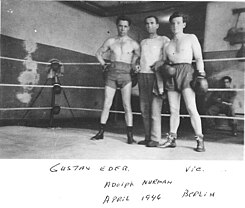Gustav Eder (boxer)
| Gustav Eder |
|
|---|---|
| Data | |
| Birth Name | Gustav Eder |
| Weight class | Welterweight |
| nationality |
|
| birthday | December 25, 1907 |
| place of birth | Bielefeld |
| Date of death | 5th February 1992 |
| Place of death | Berlin |
| size | 1.71 m |
| Combat Statistics | |
| Struggles | 162 |
| Victories | 121 |
| Knockout victories | 59 |
| Defeats | 18th |
| draw | 23 |
Gustav Eder (born December 25, 1907 in Bielefeld , † February 5, 1992 in Berlin ) was one of the most successful German professional boxers .
German champions
The welterweight was from December 8, 1930 to June 17, 1949, with only one interruption, German professional boxing champion. On January 25, 1947 Dieter Hucks created the sensation and dethroned Eder by knocking out in the first round. After only three and a half months, the series champion won the title against Alois Ulderich again. Born in Bielefeld, he contested a total of 35 title fights.
European champion
In 1934, the filigree technician with the hard punch became European champion with a knockout victory against Nestor Charlier and successfully defended the crown eight times. In his career from 1928 to 1949, when he resigned at the age of 41 in Düsseldorf with a draw in the title fight against Hans Schmitz, Eder played 162 professional fights.
After the active career
After his active career, the Eiserne Gustav , as he was called by his friends (as he was later also called Bubi Scholz ), opened his pub Bei Gustav Eder near Kurfürstendamm . Eder himself stood behind the counter for 30 years. As early as 1936, Eder had run a boxing school with a hotel in Benneckenstein (Harz) .
On February 5, 1992 at the age of 84, Eder died in his hometown of Berlin. The then President of the Bund Deutscher Berufsboxer (BDB) Kurt Halbach said on the occasion of Eder's death: "Gustav Eder was one of the greatest boxers we have ever had".
The fight between Eder and Trollmann and his circumstances
In July 1933 - after the Nazi regime had been in power for half a year - the two most outstanding German boxers in their weight classes met: Gustav Eder in the welterweight division and his opponent Johann Wilhelm Trollmann in the middleweight division . In the previous fight, Trollmann had defeated the then 20-year-old Adolf Witt over 12 rounds on points by letting the heavier opponent, who had previously defeated Trollmann or won a draw, run into the void and countered. Through this fight Trollmann was briefly - for eight days - German light heavyweight champion . The boxing association, which had meanwhile been penetrated by the Nazis, succeeded in ensuring that Trollmann lost his title again at the green table on the basis of flimsy pretexts. The actual reason for the withdrawal was the fact that Johann Wilhelm Trollmann was a Sinto and was therefore classified as racially unworthy in the eyes of the Nazi regime. The fact that the two boxers nevertheless boxed for Eder's German welterweight title in the Kreuzberg Bockbierbrauerei in Berlin in the summer of 1933 only seems paradoxical at first glance: Eder, who was 9 cm shorter and six kilograms lighter than his opponent, should repeat what Trollmann had achieved a few months earlier against the larger and heavier boxer Witt, achieve an overwhelming victory and thereby prove the racial superiority of the Aryans over other "inferior races". The two boxers and their fight were used to support the theses of those in power. The argument between the two pugilists, which could have been very interesting under normal circumstances, turned into a farce, because Trollmann requirements were imposed that severely restricted his manner of fighting (for example, he was not allowed to make use of his range advantage and not boxing at a distance). Johann Wilhelm Trollmann lost after five rounds by knockout and thus retained his boxing license for a few months until he was killed in a concentration camp in 1944 . Eder remained - with a four-month break in 1947 - German welterweight champion until 1949. How he felt and evaluated the circumstances of his fight against Trollmann is not known. The fact is that both the print media and functionaries of the boxing associations hushed up this tragedy after the end of the Nazi dictatorship and only reacted to it after a book was published in the late 1990s that dealt with the fate of Trollmann.
Web links
- Gustav Eder in the BoxRec database
- DER SPIEGEL 5/1947
| personal data | |
|---|---|
| SURNAME | Eder, Gustav |
| BRIEF DESCRIPTION | German boxer |
| DATE OF BIRTH | December 25, 1907 |
| PLACE OF BIRTH | Bielefeld |
| DATE OF DEATH | 5th February 1992 |
| Place of death | Berlin |
